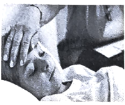题目内容
—__________ is your grandmother?
—She is fine.
A.What B.How C.Where D.When
练习册系列答案
相关题目
Lost My school ID card. I’m in Class 2, Grade 7. Please call 35656784. Lucy |
News A basketball match between Class 3 and Class 1 in the gym (体育馆) at 2:30 pm. This Saturday. Come and watch it. |
For rent (出租) A nice house with a garden. 200 $ a month. Call Bob at 13839430248 after 2:20 pm. on Sunday. |
1.What is Lucy?
A.A teacher. B.A student. C.A worker. D.A farmer.
2.If you like ball games very much, where can you go?
A.Lost and Found. B.The playground. C.The nice house. D.The gym.
3.Mr. Smith’s wife likes planting flowers and they want to rent a house. Who should they call?
A.Mary. B.Bob. C.Tina. D.Lucy.


